Top 20 Big Data Analytics Companies For Small Business
Big Data — is a pretty common concept in IT and digital marketing. Essentially, the definition is on the surface: the term “big data” implies managing and an analysis of big volumes of data. Broadly speaking, this is information which cannot be processed by classical approaches due to its volume.
Big Data — what it is?
Digital technologies now appear in every sphere of human lives. Data volumes recorded in the worldwide storage increase every single moment, and this means that information storage conditions should modify with the same page as well as there have to be new volume buildup possibilities.
IT experts suggest that the expansion of Big Data and its acceleration of growth have become the objective reality. Every single moment giant volumes of content are being generated by such sources as social networks, information websites, and file sharing platforms which altogether only represent a hundredth of suppliers.
According to the research conducted by IDC Digital Universe, in the nearest 5 years the global data volume will roll over to 40 zettabytes, so that by the year 2020, there will be 5200 gigabytes of information per capita.
In fact, general information streams are not being generated by people. It’s constant interaction of robots that serves as a source of data generation. These robots are monitoring devices, sensors, surveillance systems, operating systems of personal devices, smartphones, intelligence systems, transducers, etc. This will have growing implications for business for many years to come, as the possibilities are really only just beginning to be explored – but what can Big Data development services do for you right now to help you get ahead?
Fundamentally, Big Data is a pretty relative and contingent concept. The most common definition is a set of information superior to the storage capacity of one personal device which cannot be processed by classical approaches used in the processing of smaller data volumes.
What is the Big Data technology? Generally speaking, the processing technology of big data volumes can be narrowed down to three major courses solving three types of tasks:
- Storage and transferring of the incoming information to gigabytes, terabytes and zettabytes for holding, processing and practical application.
- Structuring of the scattered content: texts, images, video and audio files, and any other types of files.
- Big Data analysis and the implementation of various approaches to processing of the scattered information and analytical reports generation.
As a matter of fact, application of Big Data implies all aspects of working with big volumes of the scattered data being constantly updated and diffused to different sources. The objective is clear – maximum operational efficiency, introduction of new products and growth of competitiveness.
Big Data issues:
Big Data issues can be narrowed down to three “V” categories — Volume, Velocity и Variety.
Storage of big data volumes requires special conditions, which are the question of space and capabilities. Speed is not only connected with possible slowdown and stopping caused by old processing methods, it is also a matter of interactivity: the quicker the process is the bigger output is and the more productive result is.
Dissimilarity and scrappiness issues occur due to an inconsistency of sources, formats and quality. In order to joint data and process it effectively, you not only need to bring it into a suitable shape, but you also need particular analysis tools (systems).
It is only part of the story. There is an issue of data value limit. It is difficult to set, and it means that you cannot predict what technologies and investments you need for further development. However, in case of specific data volumes (for instance, a terabyte) one can use the existing procession tools which are growing rapidly.
There is an issue connected with the absence of transparent principles of working with such a volume of data. Dissimilarity of streams only makes matters worse. How to appeal to their application to make them work? The development of new Big Data analysis tools is needed here to make a stream helpful information provider. According to suggestions of the U.S. universities representatives, now is perhaps the time to introduce and develop the new branch of knowledge – the study of Big Data.
Basically, this is the reason of delay of the implementation of Big Data projects in companies (putting one more factor to the side – relatively high implementation costs).
Selection of data for future processing and the analysis algorithm may cause troubles because there is imperceptions of what data should be gathered and stored and what data can be neglected. Another pain point falls into place – lack of professional specialists who can be trusted to conduct an in-depth analysis, to generate reports for solving business tasks and consequently to extract profits (return investments) from using Big Data.
Another Big Data issue is ethical in nature, namely: how does data gathering (behind user’s back) differ from violation of the privacy right? Thus, the information saved in search engines such as Google and Yandex lets companies update their services, make them more convenient for users and create new interactive programs.
Search engines record every user click on the Internet; their IP address is open along with location, interests, online purchases, private data, messages in their inbox and other factors which allow demonstration of contextual advertising according to user behavior on the Internet. In addition, companies do not ask for permission of such actions, therefore a user cannot choose what information they will provide on themselves. In other words, in Big Data all information is being gathered by default and then stored on servers of those websites.
Here we come across another issue – data security and safety in use. For instance, the information on potential customers and their website traffic in online stores can be used in solving various business tasks. But safety of the analytical platform to which users automatically transmit data (simply because they entered a website) stirs up disputes. Even super protected servers of governmental secretive agencies cannot withstand current virus and hacker attacks.
Big Data history:
Big Data algorithms themselves appeared with the implementation of the first highly productive servers (mainframes) having enough capacity for quick information processing and suitable for computer calculation and further analysis.
The term Big Data has been first announced in 2008 on pages of the special issue of Nature magazine in the article by Clifford Lynch, editor-in-chief. That issue was dedicated to global data expansion and its scientific assignment.
Specialists maintain that any information streams with daily traffic of over 100 gigabytes can be called big data.
However, in the last couple of years scientists have been noting that the term Big Data became popularized much, it is now being used practically everywhere data streams are concerned, and, as a consequence, the term is now being perceived in too general and indistinct way. It’s incognizant journalists and inexperienced entrepreneurs using the term excessively who are to blame. From the perspective of foreign experts, the term has brought discredit on itself lately and now is the time to abandon it.
Currently world community is again speaking about big data. The reasons for this are constantly growing data volumes and lack of structure of that information. Entrepreneurs and scientists are concerned about qualitative data interpretation issues, development of tools to work with data and development of storage technologies. The implementation and active use of cloud storage and calculation models work towards the above mentioned kinds of development.
Big Data in marketing:
Information is a major aspect of successful growth forecasts and plotting of a marketing strategy capable hands of a marketer. Big data analysis method is for a long time being applied to determine target audience, their interests, demand, and user activity. Thus, Big Data is the most accurate marketing instrument for predicting the future of a company.
For instance, analysis of big data allows showing an advert (on the basis of the famous model of Real Time Bidding auction) to only those customers interested in the product/service.
Big Data application in marketing lets business people:
- Better know their customers and attract corresponding audience on the internet;
- Evaluate the satisfaction level of the customers;
- Understand whether the offered service meets customer needs and expectations;
- Find and implement new instruments increasing customers’ trust and loyalty;
- Create desirable projects.
Google.Trends, for instance, will accurately provide a marketer with a forecast of seasonal changes of the demand for a particular product, click fluctuation and geography. You can march this information to the statistics of your website and then lay out the plan of advertising budget stating the month and region.
20 BIG DATA MYTHS:
1. Big Data is something new
Actually data volumes have increased much lately. So did instruments and technologies which allow working with data. But you cannot call this process a revolution; this is rather a classic example of evolution. True, this evolution is exponential.
2. Big Data will change anything in the world
The biggest overheated myth caused by confusion in terminology. It’s confusion which lead to Gartner’s attempts to switch the focus from Big Data to Machine Learning. Numerous expectations have not been met, because Big Data does not always result in tangible benefits.
3. Primary Big Data costs are equipment and software
Unfortunately, in everything connected with the application of information technologies success depends on the team and specific members. As soon as the team masters the storage technology and derives benefits from the data, there is a new set of tasks connected with scaling, data security and management, testing framework and development process arrangements, staff training, etc.
4. You do not have to overthink about optimization when working with Big Data
If you have much data and the existing instruments allow analyzing it, this does not mean that you do not have to prepare the data. If you have bad data, then you will for sure have bad results. Working with big data requires the correctly arranged process, the most important stage of which is the preparation of data for analysis.
5. It suffice to hire one cool Data Scientist
You may start from one “universal soldier”, but you cannot do without a team. The best result is delivered when the analyst in on firm ground in terms of understanding the needs of a business. However, it is impossible to find specialists who have expertise in several business domains.
6. You necessarily have to implement Machine Learning
Statistically, 85% of what people consider Machine Learning relates to tasks of Statistics. Find Statistics specialists as a first step.
7. Every current problem is an issue of Big Data
For good or for ill, most tasks require small data. Big Data is not a universal remedy and cannot always provide the expected result.
8. We have to little data for Big Data
Many people think that they do not have enough data to analyze it with Big Data instruments. However, experience has proven that not all data in companies is being gathered, and some people are not ready to enrich their data at the expense of external data. Data increase every day. If you think today that you do not have enough data, when you look closer you will notice that today your data is too much.
9. We need real-time data
To build forecast models of high quality, you need historical data. That is why you need to first solve the task of data accumulation and then go to real-time analytics.
10. Data Analysts are “new gods” of the media age
They are not gods, but you cannot do without them. Nevertheless, instruments for independent working with data become friendlier. Marketers and business users currently can solve analysis tasks without hiring a Data Scientist.
11. Big Data knows answers to all questions
To get the correct answer you need to pose the right question.
12. Hadoop is the Holy Grail of Big Data
For effective work with Hadoop you need qualified engineers. And, for the right organization of work you will need numerous instruments and add-ons. Hadoop does not solve all your tasks.
13. Big Data is the problem of IT guys
If Big Data do not cross the line of IT department, then you can forget about any business breakthroughs. You can only enter upon the search for precious knowledge by involving business divisions.
14. When we have much data we can neglect errors in data sets
The issue of data quality quickly becomes the important task in an organization. Test and training samples of low quality may destroy all attempts of proving the correct hypotheses.
15. Classic data storages live their lives
Yes and no. The task of storage is to prepare qualitative data for further analysis. Within borders of an organization you need to understand how storage and “new big data” should coexist and be used in the general analysis and decision making processes.
16. Big Data are only for Big Companies
Today even small startups are capable of generating and processing huge bodies of data. In digital economy each business is based on data.
17. All our rivals have already implemented Big Data
Experience has proven that very few companies learned to work with their own data, and there are the very few companies that learned to cream off the best data. The early bird catches the worm.
18. Big Data excludes a human from a decision making process
Currently data analysis helps a person make decisions. Most business decisions are being taken on the basis of intuition and expertise, in which analysis results may only be an additive.
19. Users want flexibility, not recommendations
Quite the opposite. You do not need many options, much data, various metrics… All you need are pieces of advice and recommendations, and strictly limited number of options, from which you need to choose the most relevant option.
20. Nobody in our company is concerned with Big Data
Even if you do not hear anything about this, it does not mean that nobody discusses Big Data. Business needs more quality reports, instruments for effective decision-making, more quality customer segments, recommendation engines, etc. Nowadays making these decisions is impossible without analysis of various kinds of data – big, small, internal, and external.
Top 20 Big Data Analytics Companies For Small Business:
IBM
IBM big data solutions can capture, manage and analyze huge volumes of structured and unstructured data to improve business insights. Read analyst report.

IBM
HP
Big Data and Analytics solutions from HP bring meaning, extended value and security to your data. Get everything you need from HP to profit from Big Data.

HP
EMC
Read how EMC’s scientists are using big data for their customers and how it becomes their most valuable asset.
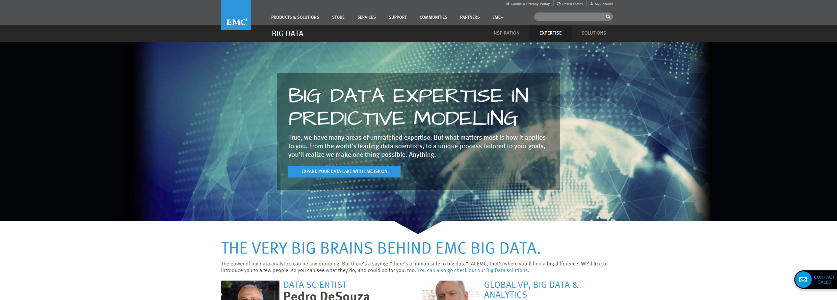
EMC
BIGDATA.TERADATA
Big Data, Big Data Beyond the Hype and Big Data Successes | Teradata. Read about the difference btw Big Data hype & today’s proven Big Data successes from the leader in Big Data Analytics & data warehousing.
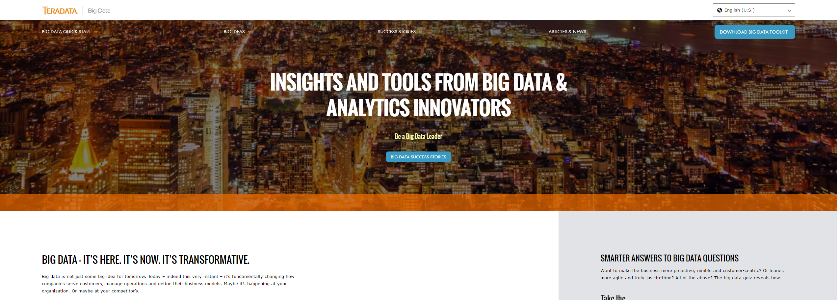
BIGDATA.TERADATA
ORACLE
What is Big Data? Learn how Oracle Big Data technologies deliver a competitive strategy on a unified architecture to solve the toughest data challenges.
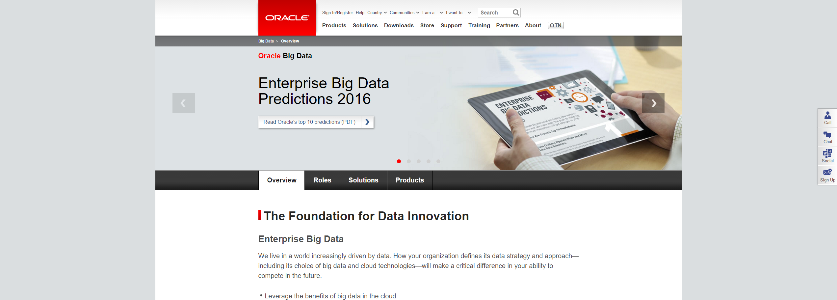
ORACLE
SAP
Explore the features, capabilities, and benefits of the SAP HANA in-memory database and computing platform.

GO.SAP
ENTERPRISE.MICROSOFT
IT Leader Archives – English (en-us).
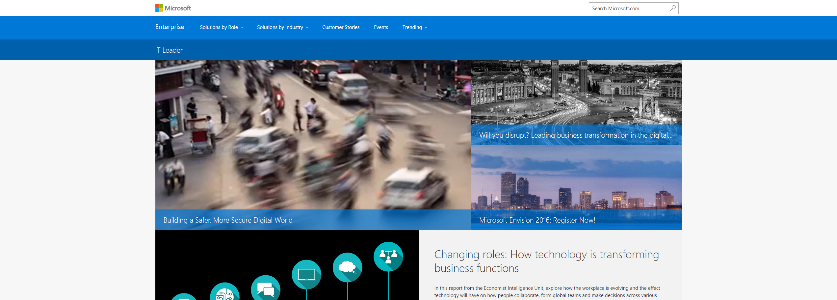
ENTERPRISE.MICROSOFT
VMWARE
Big Data Extensions: resource efficiency and architectural flexibility. Easily deploy and manage an efficient and scalable Hadoop platform.
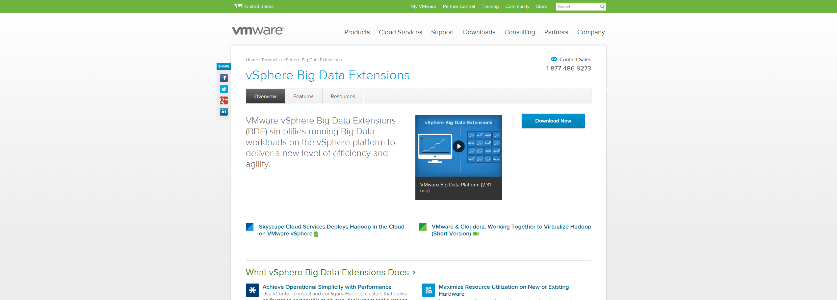
VMWARE
CLOUD.GOOGLE
BigQuery – Large-Scale Data Analytics — Google Cloud Platform. A fast, economical and fully managed data warehouse for large-scale data analytics.
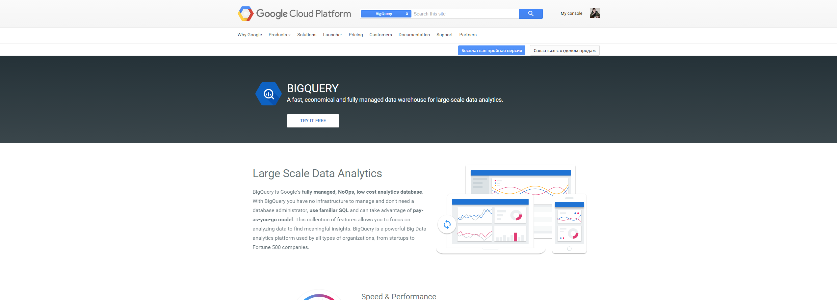
CLOUD.GOOGLE
SPLUNK
Big data analytics solutions: machine data can reveal customer behavior, security threats | Splunk. Splunk Enterprise is the leading platform to collect, analyze and deliver real-time insights from machine-generated big data. Try Splunk Enterprise and Hunk| Splunk Analytics for Hadoop for free.
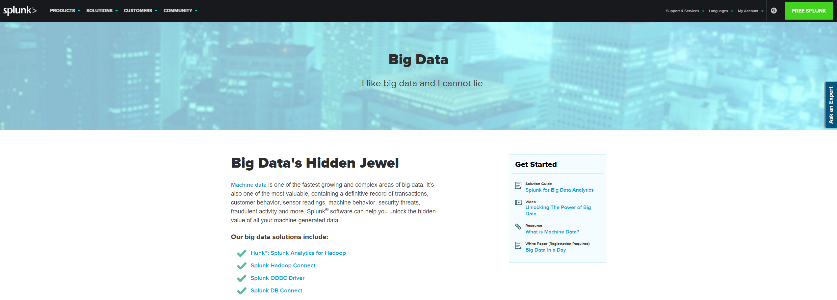
SPLUNK
MEMSQL
MemSQL: The Fastest In-Memory Database. MemSQL is a distributed In-Memory Database that lets you process transactions and run analytics in real-time, using SQL. Download now and see how it works.
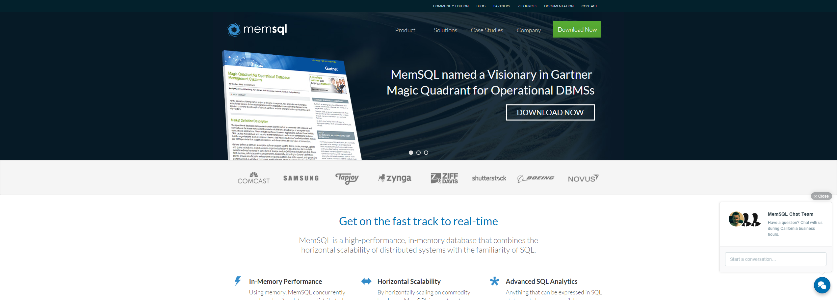
MEMSQL
PALANTIR
Palantir builds software that connects data, technologies, humans and environments.

PALANTIR
TRIFACTA
Data Wrangling & Exploratory Analysis Platform. Trifacta’s self-service data preparation platform helps data scientists and analysts discover, wrangle, and visualize complex data quickly and intuitively.

TRIFACTA
DATAMEER
Datameer is the only end-to-end big data analytics platform for Hadoop that empowers business users to directly integrate, analyze, and visualize any data.
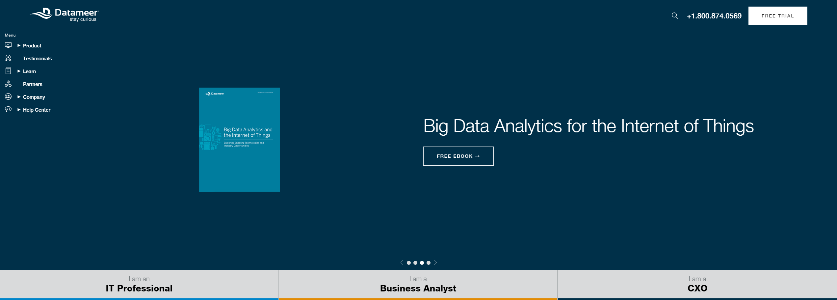
DATAMEER
TAMR
Tamr quickly, efficiently and cost-effectively connects and enriches all of your internal or external data sources—whether structured, semi-structured or unstructured—enabling you to leverage 100% of your data to drive innovation and decision making.

TAMR
NEO4J
The World’s Leading Graph Database. Unlock the value of your connected data and build intelligent applications at scale with Neo4j, the world’s fastest and most scalable graph database.

NEO4J
DATASTAX
DataStax powers the big data applications that transform business and profoundly improve customer experiences through Apache Cassandra™, the massively scalable.

DATASTAX
INFOBRIGHT
Infobright – Analytic Database for the Internet of Things. Infobright technology combines a column-oriented database with our Knowledge Grid architecture to deliver the ideal solution for your growing analytic needs.
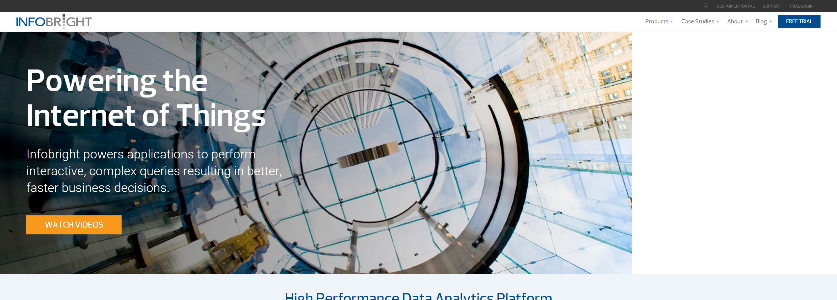
INFOBRIGHT
FRACTALANALYTICS
Leading companies leverage Big Data, analytics and technology to drive smarter, faster and more accurate decisions in every aspect of their business.We serve as strategic partner to our clients where.
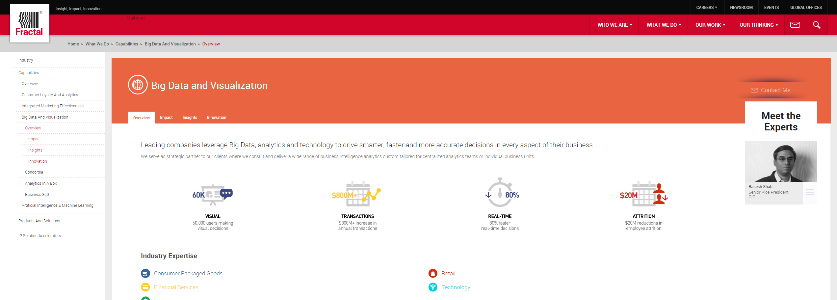
FRACTALANALYTICS
METRICINSIGHTS
Business Intelligence Software | Metric Insights.
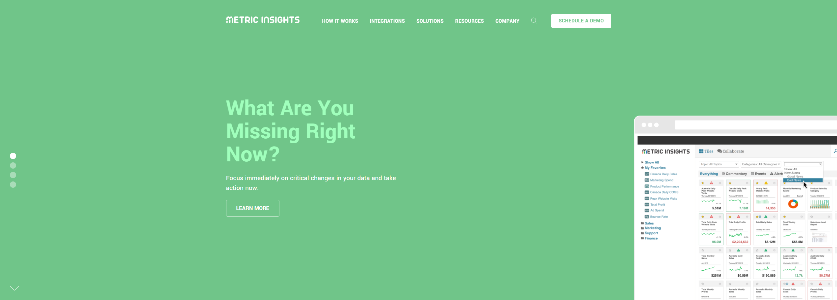
METRICINSIGHTS
INFORMATICA
Informatica: Data integration leader for Big Data & Cloud Analytics.
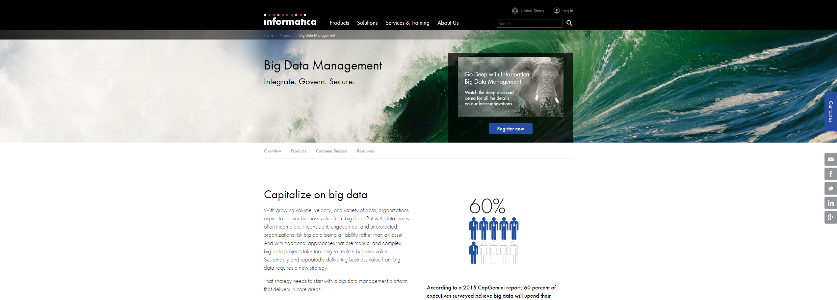
INFORMATICA
SYNTASA
SYNTASA extends existing digital marketing analytics platform with a real time and highly scalable big data solution. Open source technology that integrates and analyzes both online and offline data. This reveals deeper, targeted customer insights that go beyond descriptive analytics to predictive and prescriptive analytics that allow advanced decision making.

SYNTASA
CHARTIO
Cloud Business Intelligence | Chartio. Know your business, grow your business. Chartio empowers the entire company to understand its data through powerful analysis and easy to create dashboards.
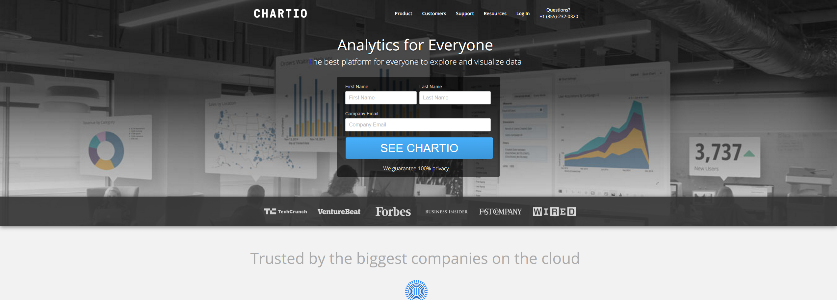
CHARTIO
THOUGHTWORKS
Agile Development and Experience Design | ThoughtWorks. A global software company focused on software design and delivery. We provide professional services and products and leading thought on Agile and Continuous Delivery.

THOUGHTWORKS
PLATFORA
Big Data Discovery | Big Data Analytics | Platfora. Platfora’s Big Data Discovery and Analytics platform is the only end-to-end solution native on Hadoop + Spark.

PLATFORA
CRAY
The Supercomputer Company | Cray. Cray, the supercomputer company, offers a comprehensive portfolio of computing, storage and analytics solutions designed to answer the world’s toughest questions. We’ve harnessed decades of know-how in our data analytics and data discovery solutions.
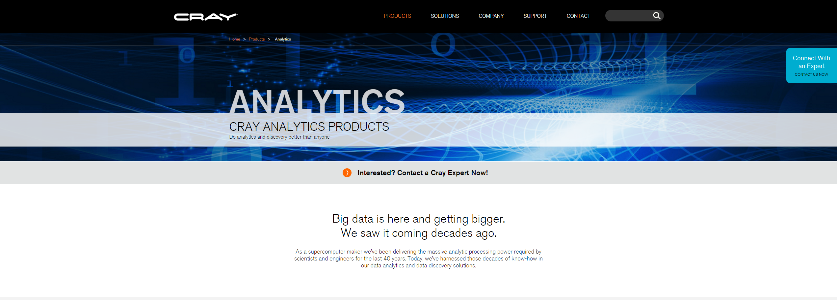
CRAY
SISENSE
Business Intelligence (BI) Software | Sisense. Business Intelligence software by Sisense, the industry leader in BI for complex data – easily prepare, analyze & explore growing data from multiple sources.
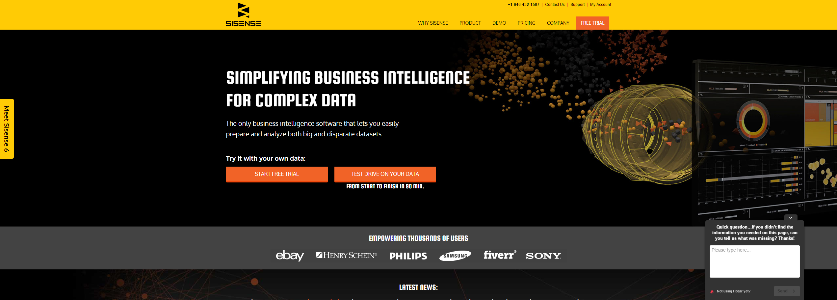
SISENSE
ZETTASET
Zettaset: Big Data Security, Big Data Solutions & Platform. Zettaset: a leading big data company offering big data solutions & big data platform designed to address enterprise requirements for security.

ZETTASET
CLEARSTORYDATA
The New World of Data Intelligence | ClearStory Data.
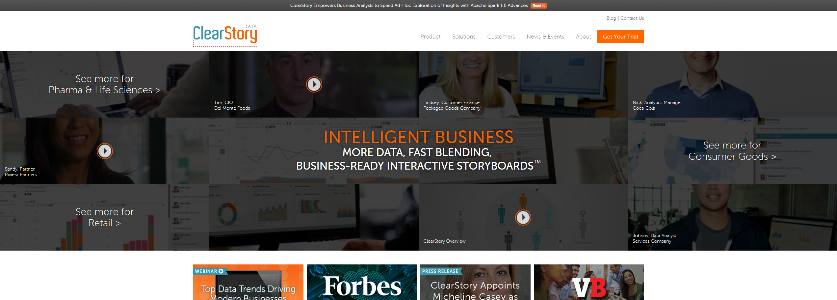
CLEARSTORYDATA
Personal contact info – slikgepotenuz@gmail.com
Permanent Address :- Montville, NJ
CEO and co-founder at Cloudsmallbusinessservice.com